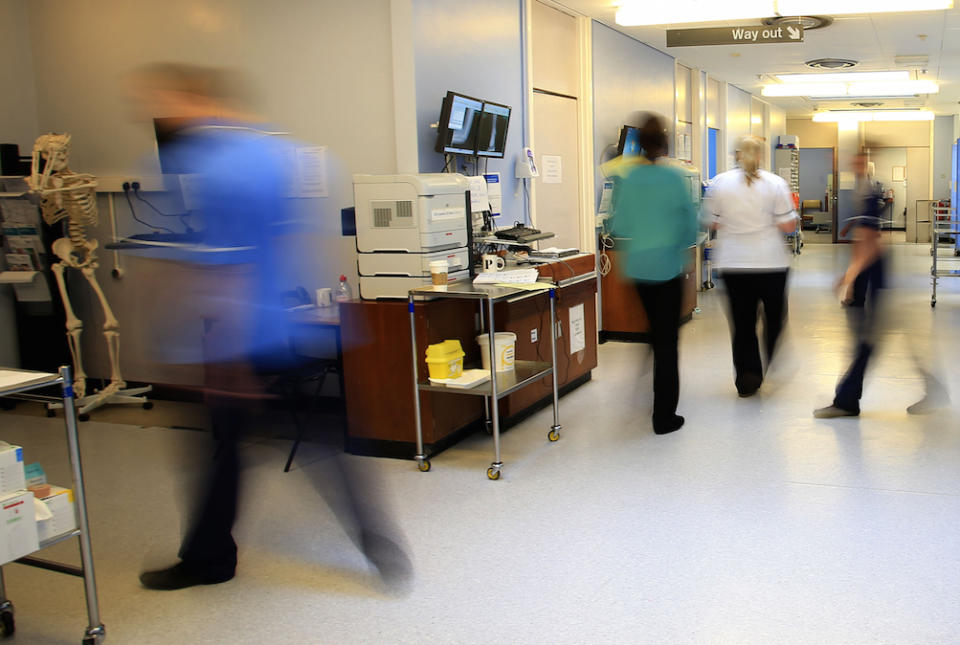EU migrants do not drain resources from the NHS, says government report
European migrants who come to the UK do not have a negative impact on the NHS, a wide-ranging government-commissioned report has said.
The long-awaited study concludes that the post-Brexit immigration system should make it easier for higher-skilled workers to come to the country, while continuing to limit access for those in lower-skilled roles.
EU nationals should be subject to the same rules as migrants from the rest of the world after free movement ceases to apply in the UK, it says.
The study, by the Migration Advisory Committee, covers may aspects of how migrants impact life on Britain.
It said migrants from the European Economic Area put more into Britain’s health service than they take out.

It wrote: “There is no doubt that EEA migrants contribute more to the health workforce than they consume in healthcare.
“This can be explained by their age profiles, they tend to be younger than the make-up of the resident population. They also tend to consider themselves to be healthier than the UK-born population.
“There is no evidence that increased migration has led to a decrease in the quality of health care services in the UK.”
BREAKING: The Tory Government’s Migration Advisory Committee debunks many of the anti-immigration myths peddled by hard right Tory MPs, Ministers & UKIP spokespeople (they’re interchangeable these days) in their new report. Here are the stand out findings: https://t.co/Uq37qY6Zrh
— Chuka Umunna (@ChukaUmunna) September 18, 2018
Labour MP Chuka Umunna said: “The Tory government’s Migration Advisory Committee debunks many of the anti-immigration myths peddled by hard right Tory MPs, ministers & Ukip spokespeople in their new report.”
The report said EU nationals should be subject to the same rules as migrants from the rest of the world after free movement ceases to apply in the UK.
The long-awaited study also concluded that the post-Brexit immigration system should make it easier for higher-skilled workers to come to the country, while continuing to limit access for those in lower-skilled roles.
Ministers asked experts to carry out an in-depth analysis on the patterns and impact of migration from the European Economic Area in July last year to help them draw up proposed new rules for after the “implementation” period ends in December 2020.
READ MORE ON YAHOO UK
Fred and Rose West’s daughter fears her parents ‘killed 30 more women’
Triathlete banned from all-you-can-eat sushi restaurant after downing 100 dishes
Watch: Ryanair passengers films baggage handler stealing from suitcase
In pictures: China’s Typhoon Mangkhut forces 2.5 million to evacuate
This picture of an ‘invisible’ car is blowing peoples’ minds online
The Migration Advisory Committee’s (MAC) final report says that, if immigration is not part of the negotiations with the EU and the UK is deciding its future system in isolation, there should be no preference given to EU citizens.
It says: “A migrant’s impact depends on factors such as their skills, employment, age and use of public services, and not fundamentally on their nationality.”
The committee emphasised that it was not expressing a view on whether immigration should be part of the negotiations.
MAC chairman Professor Alan Manning said: “If – and this is not an MAC recommendation – immigration is not to be part of the negotiations with the EU and the UK is deciding its future migration system in isolation, we recommend moving to a system in which all migration is managed with no preferential access to EU citizens.”

This would mean ending free movement but that would not make the UK unusual, he said, citing Canada’s approach as an example.
Prof Manning added: “The problem with free movement is that it leaves migration to the UK solely up to migrants and UK residents have no control over the level and mix of migration.”
The review also suggested the future immigration policy should favour high-skilled workers as there is clear evidence they bring benefits to the UK’s public finances, innovation and productivity.
But in a finding that is likely to spark opposition from some sectors, the MAC concludes that there is no need for a specific migration route for low-skilled work, with the possible exception of a seasonal agricultural scheme.
The report recommends that a cap on the number of Tier 2 skilled work visas should be scrapped and the scheme opened up to migrants in medium-skilled posts.

Professor Manning said: “Our recommendations to the government on a future work immigration system post-implementation period are designed to benefit the resident UK population.”
The 132-page report assessed the impact of EEA migration on a number of areas including the labour market, productivity, public services and communities.
It found that migrants have no or little impact on the overall employment outcomes of the UK-born workforce, with more negative effects for the lower-skilled and more positive effects for the higher-skilled.
Existing evidence and analysis presented in the report suggests migration is not a “major determinate” of the wages of UK-born workers.
The MAC added that it found some evidence suggesting lower-skilled workers face a “negative impact” while higher-skilled workers benefit, but the magnitude of the impacts are “generally small”.
The report also said that EEA migrants pay more in taxes than they receive in benefits and that there is no evidence to suggest migrants are linked to any increases in crime, nor any evidence that migration has reduced the quality of healthcare or the educational attainment of UK-born children.
The latest statistics put estimated net EU migration – the balance between arrivals and departures – at around 87,000, the lowest level for more than five years.
However, overall net migration including from outside the EU remains almost three times the government’s target of less than 100,000.

 Yahoo Movies
Yahoo Movies 
